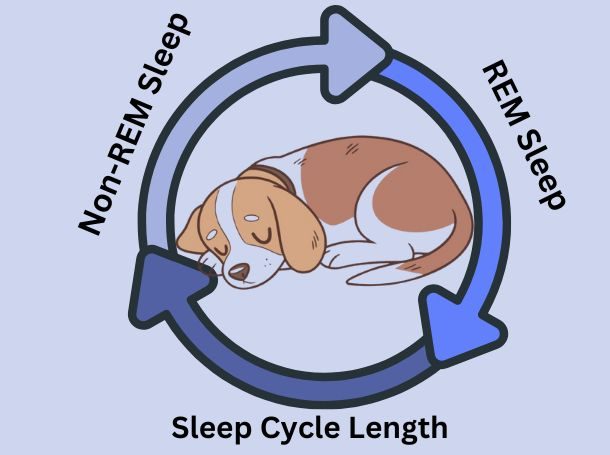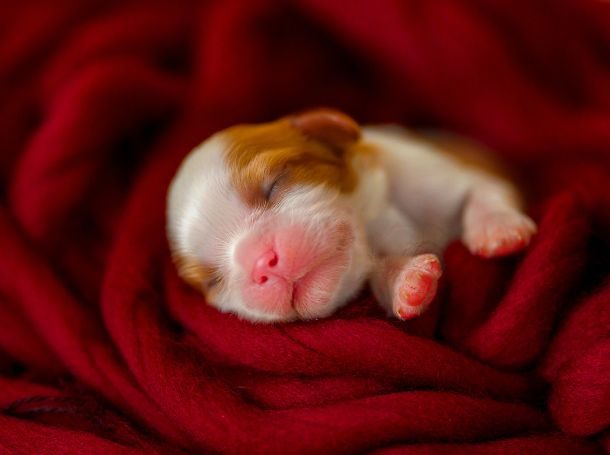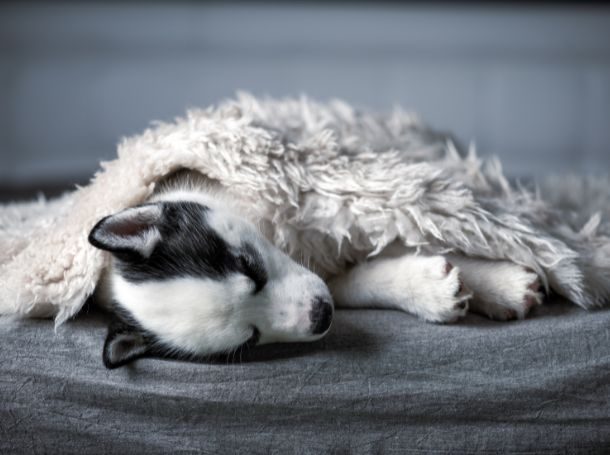
Puppy Sleep Patterns Explained: Everything You Should Know
- March 3, 2025
Table of Contents
As a new puppy parent, you’re likely filled with questions about your puppy’s needs. One of the most pressing queries you might have is: “How much sleep does my puppy need?“ Understanding puppy sleep patterns is essential, not only for your puppy’s well-being but also for your peace of mind. Puppies sleep a lot—up to 18-20 hours a day—which is completely normal! In this guide, we’ll break down everything you need to know about puppy sleep patterns, why sleep is important, and how you can ensure your pup gets the rest they need to grow and thrive.
Why Do Puppies Sleep So Much?
If you’re a new puppy owner, you’ve probably noticed how much your puppy sleeps. It might even seem like they’re asleep more than they’re awake! But don’t worry—this is normal. Puppies sleep because their bodies and brains are rapidly developing during their first few months of life.
1. Growth and Development
Puppies experience rapid growth during their early months, and sleep is essential for this. Sleep allows their bodies to rest, repair, and grow. The immune system, muscles, and bones all undergo crucial developmental processes while your puppy is sleeping.
2. Mental Stimulation
Puppies also need to process all the new information they take in during the day, including social interactions, learning new commands, and exploring their environment. Sleep helps consolidate memory and learning, just like it does for humans.
3. Energy Replenishment
Puppies have a lot of energy, and their sleep is crucial to recharge their batteries. After a day of play, training, or learning, a nap allows your puppy to restore their energy for the next bout of activity.
Understanding Puppy Sleep Cycles

Like humans, puppies experience different stages of sleep. Puppy sleep cycles can be broken down into two major types: Non-REM (Rapid Eye Movement) sleep and REM sleep.
1. Non-REM Sleep:
Non-REM sleep is divided into several stages. During these stages, puppies’ bodies rest and repair, but their brains are less active than in REM sleep. Non-REM sleep helps your puppy physically recuperate from the day’s activities.
- Light Sleep: Your puppy’s body relaxes, and their heart rate and breathing slow down.
- Deep Sleep: During this stage, your puppy’s muscles relax even further, and the body engages in healing processes such as cell regeneration.
2. REM Sleep:
REM sleep is the stage where your puppy’s brain becomes highly active, and vivid dreams or even sleepwalking can occur. Puppies experience rapid eye movement and muscle twitching, which is thought to be linked to the processing of memories and emotional experiences.
- Dreaming: Just like human babies, puppies can have dreams during REM sleep. You might notice your puppy’s paws twitching or making soft sounds, which is likely them dreaming about the day’s adventures!
3. Sleep Cycle Length:
The average sleep cycle for a puppy lasts around 45 minutes, with REM sleep taking up about 20% of the cycle. Younger puppies may have shorter cycles, while older puppies or adult dogs might have longer ones.
How Much Sleep Does a Puppy Need?

The amount of sleep a puppy requires depends largely on their age, size, and activity level. While each puppy is different, here’s a rough guideline for the number of hours of sleep a puppy needs based on age:
1. Newborn Puppies (0-2 Weeks):
- Sleep Duration: 90% of the time is spent sleeping (18-22 hours a day).
- Why So Much Sleep? Newborn puppies are still developing their internal systems, including their circulatory, digestive, and nervous systems. Sleep is essential for this rapid growth.
2. Puppies Aged 2-4 Months:
- Sleep Duration: 18-20 hours a day.
- Why So Much Sleep? This is the stage where puppies begin to explore the world more, requiring more rest to recharge and consolidate their learning experiences.
3. Puppies Aged 4-6 Months:
- Sleep Duration: 16-18 hours a day.
- Why So Much Sleep? Puppies this age begin to have more energy and are generally more active. However, they still require a lot of rest to support their growth and muscle development.
4. Puppies Aged 6 Months and Older:
- Sleep Duration: 14-16 hours a day.
- Why So Much Sleep? As puppies approach adulthood, they start to need less sleep. However, they’re still growing, and regular rest is necessary for muscle recovery and brain development.
Factors That Influence Puppy Sleep Needs
Every puppy is unique, and several factors can impact how much sleep they need. These include:
1. Breed
Some breeds require more sleep than others. For example, large breed puppies like the Great Dane or Mastiff may need more sleep than smaller breeds like the Chihuahua or Yorkie, as larger breeds tend to grow faster.
2. Activity Level
Puppies that are more active during the day will need more sleep to recuperate. Puppies that engage in lots of play, exercise, and exploration will likely sleep more to replenish their energy reserves.
3. Health and Medical Conditions
If a puppy is sick or dealing with a medical condition, they may sleep more or less than usual. For instance, puppies recovering from surgery or vaccinations might need more sleep for healing, while puppies experiencing discomfort or pain may have disturbed sleep patterns.
4. Environment
A stressful environment, noisy surroundings, or lack of comfort can also affect a puppy’s sleep. Puppies in high-stress situations, such as in new homes or during travel, might have more difficulty sleeping.
Common Sleep Issues in Puppies

While most puppies sleep soundly, there are a few common sleep issues that puppy owners may encounter. Let’s take a look at some of these concerns:
1. Overtiredness:
Just like human babies, puppies can become overtired, which makes it harder for them to fall asleep or stay asleep. Overtired puppies can be more irritable, less focused, and have difficulty winding down.
Solution: To avoid overtiredness, establish a routine for naps and nighttime sleep, ensure your puppy gets enough exercise during the day, and create a calm, quiet environment for them to rest in.
2. Separation Anxiety:
Many puppies experience separation anxiety, which can make it difficult for them to sleep, especially when left alone. They may whine, bark, or show signs of distress when their owners are not around.
Solution: Start crate training early, create positive associations with being alone, and gradually increase the duration of time you leave your puppy alone. Comfort items like a piece of your clothing or a safe chew toy can help alleviate anxiety.
3. Sleep Regression:
Some puppies may go through phases where they experience sleep regression, usually around 12-16 weeks. During this time, puppies may wake up more frequently during the night or struggle to settle.
Solution: Be patient and consistent with their sleep routine. Try to avoid reinforcing bad behavior, and use positive reinforcement when your puppy settles down for sleep.
4. Nightmares or Night Terrors:
Puppies, like humans, can have dreams during REM sleep. Sometimes, these dreams can be unsettling, leading to twitching, barking, or crying.
Solution: Nightmares or night terrors usually aren’t a cause for concern. If they persist, however, consult a veterinarian to rule out any underlying medical issues.
Creating the Perfect Sleep Environment for Your Puppy

A good sleeping environment is crucial for a puppy to rest peacefully. Here’s how you can create the best environment for your pup:
1. Ideal Sleeping Space
Create a designated area for your puppy to sleep, whether it’s a crate or a cozy dog bed. The space should be safe, comfortable, and quiet, where your puppy can feel secure.
2. Room Temperature
Keep the room temperature between 65-75°F (18-24°C). Puppies are sensitive to temperature extremes, so ensure they’re neither too hot nor too cold. Provide a blanket or heating pad if necessary to keep them warm.
3. Lighting
Make sure the sleeping area is dark enough for your puppy to sleep soundly. If you have multiple pets or family members, consider using a nightlight to avoid startling your puppy during the night.
4. Consistent Sleep Routine
Puppies thrive on routines, so establish a consistent bedtime. This helps your puppy’s internal body clock adjust, making it easier for them to fall asleep and wake up at regular intervals.
When to Seek Veterinary Advice
While most puppy sleep patterns are normal, there are times when you should consult a veterinarian, including:
- Health issues: If your puppy is showing signs of illness, lethargy, or unusual sleep patterns (such as constant sleeping or trouble staying awake), consult your vet.
- Extreme sleep deprivation: If your puppy consistently sleeps less than normal or experiences excessive waking at night, a health condition could be at play.
Conclusion
Puppy sleep patterns are an important part of your pup’s development, and understanding them can help ensure your puppy grows into a happy, healthy dog. By establishing good sleep routines, creating a comfortable sleep environment, and recognizing potential issues, you can give your puppy the rest they need to thrive. Remember, a well-rested puppy is a healthy, well-behaved puppy!
Have you noticed any changes in your puppy’s sleep patterns? Share your experiences and tips in the comments below!
Puppies need a lot of sleep, typically around 18 to 20 hours a day, depending on their age and activity level. Newborn puppies sleep almost all the time (up to 90%), while older puppies (4-6 months) may need around 16-18 hours of sleep.
Puppies sleep so much because they are growing rapidly, both physically and mentally. Sleep is essential for their development as it allows their bodies to repair, regenerate, and store the new experiences and information they gather during the day. It’s also crucial for their immune system and brain development.
While puppies generally sleep a lot, excessive sleep or lethargy could be a sign of an underlying health problem. If your puppy is consistently sleeping more than usual, showing no interest in playing, or seems sluggish, it’s best to consult a veterinarian to rule out any health issues.
If your puppy is having trouble sleeping, consider factors like their sleep environment, daily routine, and exercise level. Make sure your puppy has a quiet, comfortable place to rest, and establish a consistent bedtime routine. Avoid over-exercising them before bedtime, and ensure they have plenty of mental stimulation during the day. If the problem persists, a visit to the vet might be necessary.
Signs that your puppy is getting enough sleep include a calm demeanor, healthy weight, and normal activity levels when they are awake. If they are excessively cranky, hyperactive, or show signs of stress or behavioral issues, it could indicate they are not getting the right amount or quality of sleep.




Leave a comment